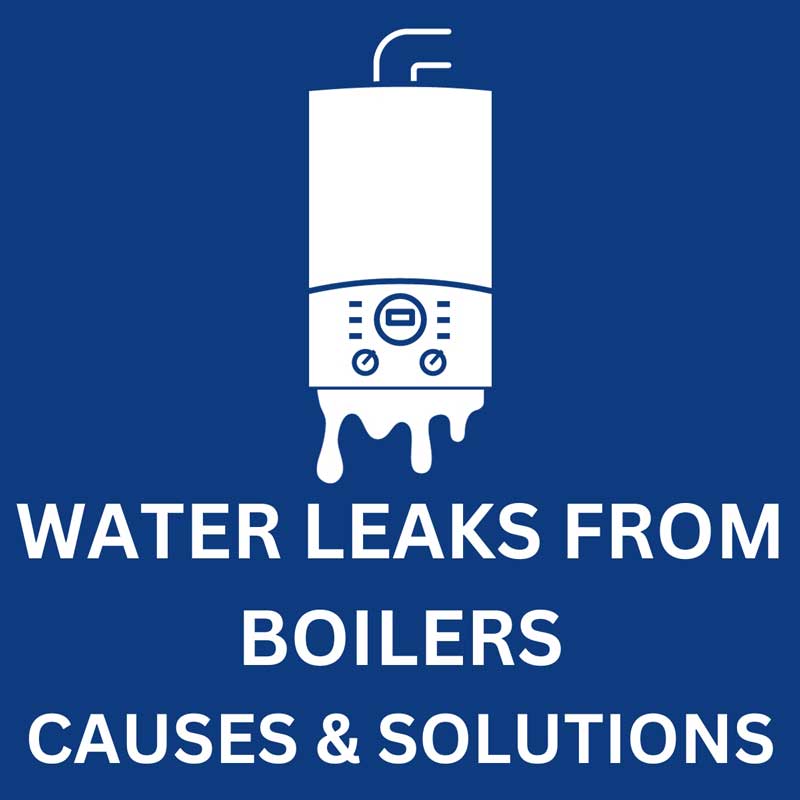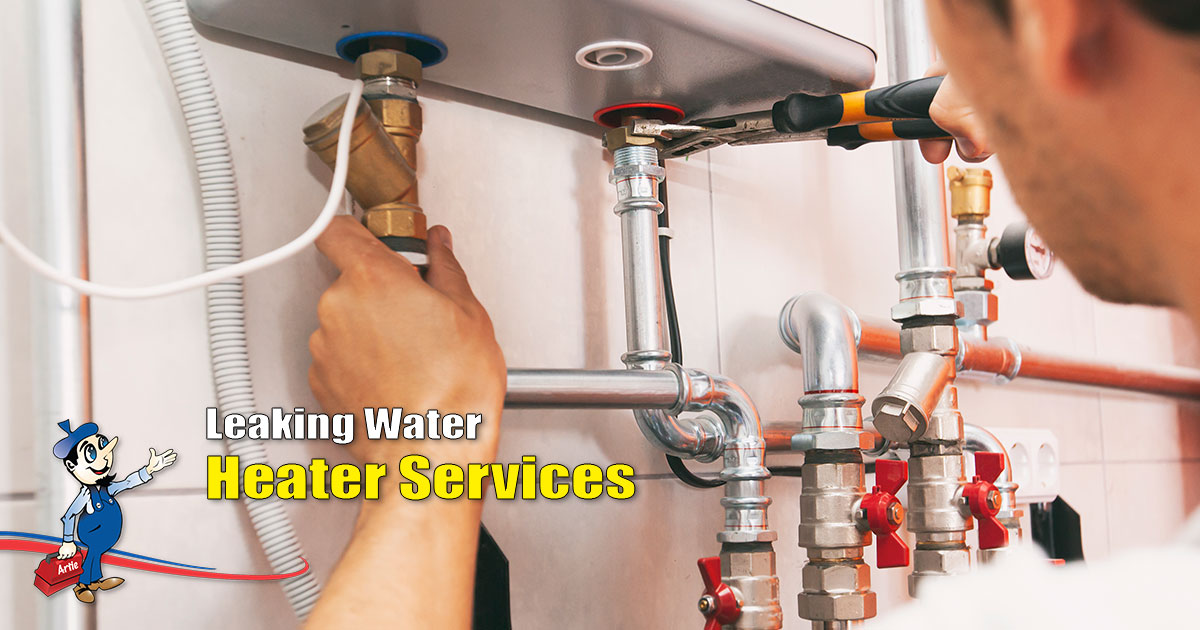A water heater may leak due to a faulty drain valve, excessive pressure, or aging. Water heaters may sometimes leak due to various reasons, including a faulty drain valve, high water pressure causing strain on the tank leading to leaks at the bottom, or simply due to the natural wear and tear that comes with the age of the unit.
When a water heater is leaking, it is crucial to address the issue promptly to avoid further damage and potentially hazardous situations. We will explore the common reasons why water heaters leak and what steps you can take to handle a leaking water heater effectively.
Let’s delve deeper into this common household issue and find solutions to keep your water heater functioning properly.


Credit: tmhughesandson.uk
- Common Causes Of Water Heater Leaks
- Immediate Steps For Handling A Leaking Water Heater
- Long-term Solutions For Water Heater Leaks
- Safety Measures When Dealing With Leaking Water Heaters
- Preventive Maintenance To Avoid Water Heater Leaks
- Frequently Asked Questions Of Why Is Water Heater Leaking
- Conclusion
Common Causes Of Water Heater Leaks
A defective or improperly closed drain valve can result in water escaping from the bottom of the water heater.
High water pressure can strain the tank, causing leaks at the bottom of the water heater.
Older water heaters are more prone to wear and deterioration, which may lead to leakage at the bottom.

Credit: www.artplumbingandac.com
Immediate Steps For Handling A Leaking Water Heater
If your water heater is leaking, take immediate action by shutting off the gas control and inspecting the relief valve. Leaks can stem from a faulty drain valve, high pressure, or aging tanks, so seek professional help to avoid long-term damage and unsafe water usage.
Turn Off The Water Heater
To prevent further water leakage and potential damage, immediately turn off your water heater. Locate the shut-off valve, typically found near the unit, and turn it clockwise to switch off the water supply.
Clean Up The Visible Water
Begin by cleaning up any visible water around the leaking water heater. Use absorbent towels or a mop to soak up the water and prevent it from spreading to other areas.
Long-term Solutions For Water Heater Leaks
Consulting A Professional Plumber
When dealing with water heater leaks, it’s crucial to seek expertise from a professional plumber. Consulting a licensed plumber ensures that the issue is properly diagnosed and addressed. Plumbers have the knowledge and tools to identify the root cause of the leak and implement the necessary repairs. Additionally, they can provide insights into preventive maintenance to minimize the risk of future leaks.
Consider Water Heater Replacement
If the water heater is aging or has recurring leaks, it may be time to consider water heater replacement. A professional plumber can assess the condition of the existing unit and recommend a suitable replacement. Upgrading to a new water heater can improve energy efficiency and reduce the likelihood of leaks in the long run. Consulting a plumber for replacement options and proper installation is essential to ensure optimal performance and longevity.
Safety Measures When Dealing With Leaking Water Heaters
When dealing with a leaking water heater, it’s essential to act swiftly to prevent further damage. Inspect the gas control valve, temperature relief valve, and drain valve for leaks. Contact a professional plumber to address the issue promptly and avoid long-term usage of a leaking water heater.
Risks Of Using A Leaking Water Heater
Using a leaking water heater can pose serious risks to your safety and the well-being of your home. Ignoring a leaking water heater can lead to a wide range of issues, including: 1. Flooding: Water leakage from a faulty water heater can quickly escalate into a flooding situation. This can lead to extensive water damage, structural issues, and the growth of mold and mildew. 2. Electrical Hazards: If the leaking water comes into contact with electrical components or wiring near the water heater, it can cause electrical shorts, sparks, or even fires. This poses a significant risk to your home and your family’s safety. 3. Gas Leaks: If you have a gas-powered water heater, a leak can be equally dangerous. Gas leaks are not only flammable but can also lead to carbon monoxide poisoning if not handled immediately and properly. Carbon monoxide is a poisonous gas that you cannot see or smell, making it extremely hazardous.Emergency Response
When dealing with a leaking water heater, taking immediate and appropriate measures is crucial. Here are some safety measures to follow:- 1. Turn off the Power: Before attempting any repairs, it’s important to turn off the power supply to the water heater. This includes both the electrical power and the gas supply. This step will help prevent any potential accidents or further damage.
- 2. Identify the Source: Carefully inspect your water heater to determine the source of the leak. Common areas where leaks occur include the pressure relief valve, drain valve, or the tank itself. Identifying the source will assist you or a professional in fixing the problem effectively.
- 3. Shut off the Water Supply: If the leaking water heater continues to release water, it’s essential to shut off the water supply to prevent the leak from worsening. Locate the main water shut-off valve and close it until repairs can be made.
- 4. Call a Professional: While you may be tempted to fix the issue yourself to save money, it’s strongly advised to call a licensed plumber or water heater technician. They are equipped with the knowledge, experience, and tools to handle the repair safely and effectively.
- 5. Take Precautions: While waiting for professional assistance, it’s important to take precautions to minimize any potential hazards. Clear the area around the water heater of any flammable materials and keep a safe distance from the leaking water to avoid slips and falls.
Preventive Maintenance To Avoid Water Heater Leaks
Regular inspection and maintenance of your water heater are crucial to prevent leaks and prolong the lifespan of your appliance. By following a few preventive measures, you can minimize the chances of water heater leaks and avoid costly repairs. Here are some important steps you should take:
Regular Inspection Of Pressure Relief Valve
The pressure relief valve is a crucial component of your water heater that helps regulate the pressure inside the tank. Over time, mineral deposits or debris can build up, causing the valve to malfunction and potentially lead to leaks. By regularly inspecting the pressure relief valve, you can ensure it is working correctly and prevent water from escaping through the valve. Here’s how you can inspect the valve:
- Turn off the power supply and shut off the cold water inlet valve to your water heater.
- Locate the pressure relief valve on the top or side of the tank.
- Slowly lift the valve’s lever to release any pressure built up inside. You should hear a hissing sound indicating the release of water and pressure.
- If water continues to flow or the valve doesn’t reset properly, it may be time to replace it. Consult a professional plumber for assistance.
Monitoring Inlet And Outlet Connections
The connections where the water enters and exits your water heater can also be prone to leaks if they become loose or damaged. Regularly monitoring these connections can help you identify any signs of leakage promptly. Follow these steps to ensure the inlet and outlet connections are secure:
- Turn off the power supply and shut off the cold water inlet valve.
- Inspect the connections at the top of the tank where the cold water enters and the hot water exits. Check for any signs of leaks, such as water stains or moisture.
- If you notice any leaks, tighten the connections using a wrench. Be careful not to overtighten, as this could cause damage to the fittings.
- If the connections are severely corroded or damaged, it may be necessary to replace them to prevent further leaks. Contact a professional plumber for assistance.
By regularly inspecting the pressure relief valve and monitoring the inlet and outlet connections, you can significantly reduce the risk of water heater leaks. Remember to always follow the manufacturer’s guidelines and consult a professional plumber if you encounter any issues or need assistance with maintenance or repairs.

Credit: www.supertechhvac.com
Frequently Asked Questions Of Why Is Water Heater Leaking
What Should I Do If My Water Heater Is Leaking?
If your water heater is leaking, turn off the gas control, check relief and drain valves, and contact a professional plumber immediately.
Why Is Water Coming Out Of The Bottom Of My Water Heater?
Water may leak from the bottom of the water heater due to a faulty drain valve, high pressure, or aging. A minor leak doesn’t necessarily mean you can’t use hot water, but it’s crucial to seek professional help promptly. Addressing the issue promptly is essential for preventing further damage.
Can I Still Use Water Heater If It Is Leaking?
If your water heater is leaking, it is not recommended to continue using it. While minor leaks may allow you to still use hot water, it is best to seek assistance from a professional plumber and not rely on a leaking water heater for the long term.
Is A Leaking Water Heater An Emergency?
Yes, a leaking water heater is considered an emergency. Immediately turn off the water and the unit’s circuit breaker, clean up any visible water, and contact a professional technician for emergency service.
How Can I Tell If My Water Heater Is Leaking?
If you notice water pooling around your water heater or dampness around the area, it’s a sign of a possible leakage.
Conclusion
If you notice your water heater leaking, it’s crucial to address it promptly to prevent further damage. Whether it’s a faulty drain valve, high pressure, or aging, understanding the cause is the first step to a solution. Don’t hesitate to seek professional assistance and take the necessary steps outlined to resolve the issue and ensure your water heater’s functionality and safety.
